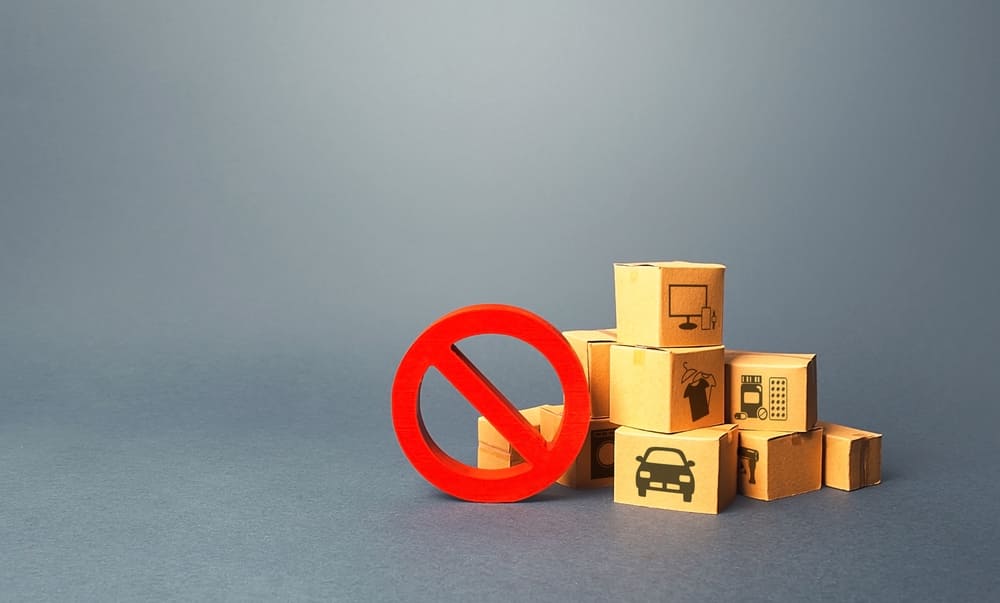What cannot be transported across borders during an international move?

Moving internationally is a major undertaking that requires not only organising transport and packing, but also understanding customs rules and international regulations. Many countries have strict rules about what can and cannot be transported across borders. Failure to comply with these rules can lead to serious legal consequences, confiscation of property and even financial penalties. In this article, we will provide a detailed list of restricted and prohibited items to help you avoid unpleasant surprises during your removals.
1. Food and plant products
- Fresh food products
Most countries prohibit the transport of fresh fruit, vegetables, meat and dairy products. These products can introduce diseases or pests that can harm local agriculture.
- Plants and seeds
The transport of plants, seeds or soil often requires special phytosanitary permits. Some plants may be considered invasive species and their import is completely prohibited.
- Products of animal origin
Products such as cold cuts, cheese, milk and eggs are strictly regulated due to the risk of introducing animal diseases.
2. Hazardous and chemical substances
- Explosives and fireworks
It is prohibited to carry any explosives, including fireworks, without the appropriate permits.
- Chemical and toxic substances
Acids, solvents, pesticides and other hazardous chemicals are usually banned or require special permits.
- Radioactive materials
The transport of radioactive materials is strictly regulated and practically impossible without specialised authorisation.
3. Weapons and ammunition
- Firearms
Most countries require special licences to transport firearms. Illegal transport can lead to serious legal consequences.
- Knives and other sharp tools
Some countries have restrictions on the carriage of knives, swords or other sharp objects.
- Ammunition
The transport of ammunition is strictly controlled and requires special permits.
4. objects of historical and cultural value
- Antiques and works of art
The carriage of antiques, paintings and other works of art requires appropriate documents to prove their legal possession and export.
- Relics and archaeological objects
Many countries prohibit the export of items of historical or archaeological interest without the relevant permits.
5. Counterfeit and pirated products
- Clothing and accessories
Counterfeit branded products are illegal and can be confiscated at the border.
- Software and multimedia
Illegal copies of software, films or music are prohibited in international transport.
6. Pharmaceutical and medical products
- Prescription drugs
The carriage of prescription drugs requires medical documentation and certificates from a doctor.
- Controlled substances
Some medicines may be considered controlled substances and their carriage is prohibited or restricted.
7. Animals and animal products
- Live animals
The transport of pets requires certain requirements, such as vaccination, chip and veterinary documentation.
- Products from endangered species
Items made from ivory, fur or the skins of endangered species are usually banned.
8. Personal and everyday items
- Alcohol and cigarettes
Most countries have limits on the transport of alcohol and tobacco products. Exceeding these limits can lead to confiscation or customs duties.
- Cash and valuables
The transport of large sums of money requires declaration at the border. Many countries have specific limits for undeclared amounts.
9 Other restricted items
- Pornographic material
Some countries prohibit or limit the transport of pornographic material.
- Eavesdropping and spying devices
Electronic equipment for eavesdropping or spying may be prohibited in transit.
Special provisions in selected countries
England
After Brexit, additional customs controls have been introduced. The transport of fresh food, meat and dairy products is prohibited. Animal passports and up-to-date vaccinations are required for animal transport.
France
France has strict regulations on the transport of alcohol (maximum 10 litres of spirit). Animal products are restricted and the carriage of plants requires phytosanitary certificates.
Germany requires a declaration for the transport of cash in excess of €10,000. The carriage of illegal substances and counterfeit products is prohibited.
In Poland, standard EU regulations apply, but special attention should be paid to transporting alcohol and cigarettes above the permitted limits.
Netherlands
The Netherlands has strict regulations on the transport of controlled substances, even if they are legal in other countries. The transport of products from endangered species is prohibited.
Belgium
Belgium restricts the transport of prescription medicines without proper documentation. Counterfeit and pirated products are also banned.
Spain
In Spain, there are limits on the carriage of alcohol and tobacco products. Products of plant and animal origin require the relevant permits.
Denmark
Denmark has strict regulations on the carriage of alcohol (limit of up to 10 litres of spirits). The carriage of plants and seeds requires special permits.
Czech Republic
The Czech Republic has limits on the carriage of tobacco products and alcohol. Pharmaceutical products require appropriate certificates.
Luxembourg
Luxembourg prohibits the transport of explosives and weapons without special permits. The carriage of counterfeit products is also prohibited.
International removals
When preparing for an international move, it is a good idea to thoroughly familiarise yourself with the customs regulations of the destination country. Consulting a professional removal company or customs agency can help avoid problems and ensure that the whole process runs smoothly. Remember that ignorance of the regulations does not absolve you of responsibility, so it is worth being well prepared and aware of potential risks.
